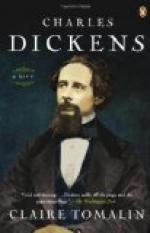inconvenience, and humiliation? Or take again
Mr. Boffin in “Our Mutual Friend.”
Mr. Boffin is a simple, guileless, open-hearted, open-handed
old man. Yet, in order to prove to Miss Bella
Wilfer that it is not well to be mercenary, he, again,
goes through a long course of dissimulation, and does
some admirable comic business in the character of
a miser. I say it boldly, I do not believe Mr.
Boffin possessed that amount of histrionic talent.
Plots requiring to be worked out by such means are
ill-constructed plots; or, to put it in another way,
a man who had any gift for the construction of plots
would never have had recourse to such means. Nor
would he, I think, have adopted, as Dickens did habitually
and for all his stories, a mode of publication so
destructive of unity of effect, as the publication
in monthly or weekly parts. How could the reader
see as a whole that which was presented to him at intervals
of time more or less distant? How, and this is
of infinitely greater importance, how could the writer
produce it as a whole? For Dickens, it must be
remembered, never finished a book before the commencement
of publication. At first he scarcely did more
than complete each monthly instalment as required;
and though afterwards he was generally some little
way in advance, yet always he wrote by parts, having
the interest of each separate part in his mind, as
well as the general interest of the whole novel.
Thus, however desirable in the development of the
story, he dared not risk a comparatively tame and
uneventful number. Moreover, any portion once
issued was unalterable and irrevocable. If, as
sometimes happened, any modification seemed desirable
as the book progressed, there was no possibility of
changing anything in the chapters already in the hands
of the public, and so making them harmonize better
with the new.
But of course, with all this, the question still remains
how far Dickens’ comparative failure as a constructor
of plots really detracts from his fame and standing
as a novelist. To my mind, I confess, not very
much. Plot I regard as the least essential element
in the novelist’s art. A novel can take
the very highest rank without it. There is not
any plot to speak of in Lesage’s “Gil Blas,”
and just as little in Thackeray’s “Vanity
Fair,” and only a very bad one in Goldsmith’s
“Vicar of Wakefield.” Coleridge admired
the plot of “Tom Jones,” but though one
naturally hesitates to differ from a critic of such
superb mastery and power, I confess I have never been
struck by that plot, any more than by the plots, such
as they are, in “Joseph Andrews,” or in
Smollett’s works. Nor, if I can judge of
other people’s memories by my own, is it by
the mechanism of the story, or by the intrigue, however
admirably woven and unravelled, that one remembers
a work of fiction. These may exercise an intense
passing interest of curiosity, especially during a
first perusal. But afterwards they fade from
the mind, while the characters, if highly vitalized




